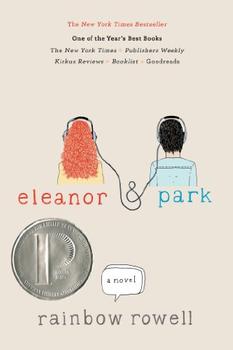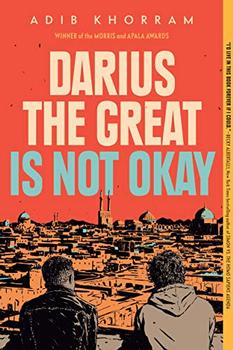Summary | Excerpt | Reviews | Beyond the book | Read-Alikes | Genres & Themes | Author Bio

Jennifer Niven's spectacular Holding Up the Universe has everything that I love about Young Adult fiction. Begin with the characters. Libby Strout and Jack Masselin are unique, yet totally relatable. Put them in a situation where they come head-to-head, not just against each other, but also against their better selves. Develop a plot that respects their personal dignity and humanity even as they stumble, make some good and some poor decisions, and eventually come into themselves as the innately good people they are.
Libby Strout is facing her first day in high school following several years of homeschooling and three years under strict medical supervision for weight loss. This was severe weight loss as Libby was the 600-pound Fattest Teen in America who had to be crane-lifted from her bed at home and delivered via truck to the hospital. Now, having lost 300 pounds, she is finally ready to resume classes in a regular school for the first time since the fifth grade. Some of the kids might recognize her, most won't. At least she hopes they don't. She's ready to start a new chapter, a clean slate, a slate that she hopes includes a spot on the school dance/cheer squad. "I'm carrying the world's biggest secret. You may not know this about me, but I love to dance."
Jack Masselin, a senior, is big man on campus. Tall, lean, good looking with a gigantic Afro, and a real party guy. Always with a ready quip, a flip response and a quick escape plan should anybody try to pin him down. See, he too has a big secret that he guards desperately. Behind that winning smile, he is face blind, something called prosopagnosia which affects about 2.5% of the population. (See Beyond the Book.) It can be congenital or brought on by a blow to the head or other factors. Jack's has never been diagnosed because, well, he's a teenager and he hasn't even told his folks of his problem. It becomes complicated because he's discovered his father is cheating. Another secret. He's the eldest of three boys in a biracial marriage and keeping secrets has become a lifestyle choice.
Have I been officially diagnosed? No. And not just because I'm guessing this is beyond the pay grade of Dr. Blume, town pediatrician. Not just because for the past few years my parents have had more than their share of shit to deal with. Not just because it's better not to be the freak. But because there's a part of me that hopes it isn't true. That maybe it will clear up and go away on its own.
Another lifestyle choice is Jack's choice of friends. They're lunkheads. It seems they've invented a game called Fat Girl Rodeo. It is just what it sounds like. And, as if to comply with some kind of twisted teenaged-guy kind of logic, Jack writes an apology note to Libby, slips it into her backpack and jumps her in the cafeteria. Hanging on for dear life to the hoots of his lunkheaded friends, Jack is suddenly thrown free even as Libby lands a lip-splitting haymaker on him. Both are humiliated and angry and sent to the principal's office where they join their parents.
Libby and Jack tell their stories in alternating chapters, so we get to know their individual points of view as they plod through the inevitable community service assignment and group therapy sessions with the high school counselor. Libby is rightly confused once she finds Jack's apology note that he had obviously delivered pre-rodeo ride. He begins to admire her chutzpa for standing up for herself by belting him. He knows he deserved it. Friendship, then trust, then mutual support, then love blooms. But first Jack confesses his disorder to Libby.
I'm looking at her, and I'm charged with all this crazy, heart-pounding adrenaline. It's almost as if she's interviewing me, but I don't mind because it's the first time I've talked about this with anyone, and it's kind of feeling a lot like freedom, like Here's a person who might actually be able to get who I am.
I don't know what there is not to love about this book. Throughout, Niven makes Jack and Libby's motives clear even as they make really bad choices. And although a reader – young or adult – may not be a three-hundred-pounder or a prosopagnosiac, we all struggle with our own insecurities and suffer fears of rejection. Holding Up the Universe is a paean to setting aside those insecurities and opening ourselves to whatever the universe brings. Highly recommended for readers of all ages 14+.
![]() This review was originally published in The BookBrowse Review in November 2016, and has been updated for the
May 2018 edition.
Click here to go to this issue.
This review was originally published in The BookBrowse Review in November 2016, and has been updated for the
May 2018 edition.
Click here to go to this issue.

If you liked Holding Up the Universe, try these:

by Rainbow Rowell
Published 2020
Set over the course of one school year in 1986, this is the story of two star-crossed misfits - smart enough to know that first love almost never lasts, but brave and desperate enough to try. When Eleanor meets Park, you'll remember your own first love - and just how hard it pulled you under.

by Adib Khorram
Published 2019
Darius doesn't think he'll ever be enough, in America or in Iran. Hilarious and heartbreaking, this unforgettable debut introduces a brilliant new voice in contemporary YA.
Your guide toexceptional books
BookBrowse seeks out and recommends the best in contemporary fiction and nonfiction—books that not only engage and entertain but also deepen our understanding of ourselves and the world around us.